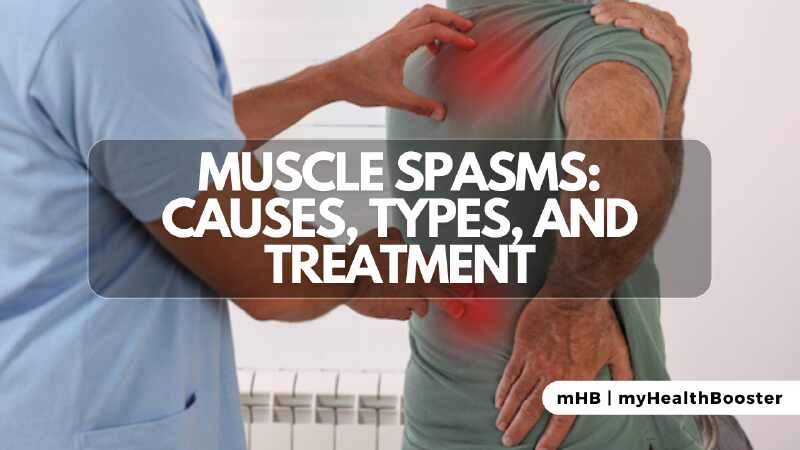Muscle spasms, involuntary contractions affecting various muscle types, can result from diverse factors, leading to a range of symptoms. This article provides insights into the types of muscle spasms, the muscles they affect, potential causes, symptoms, diagnosis, and available treatments.
Types of Muscles
- Cardiac Muscle: Powers the heart.
- Skeletal Muscle: Governs external body movements.
- Smooth Muscle: Manages internal structures’ movements (e.g., arteries, intestines, bladder).
Skeletal Muscle Spasms
- Causes: Overuse, fatigue, dehydration, and electrolyte imbalances.
- Characteristics: Sudden, painful, short-lived; often relieved by gentle stretching.
- Considerations: Seek medical care for severe or recurrent spasms.
Smooth Muscle Spasms
- Examples: Colicky pain in organs like the colon (menstrual cramps, gallbladder pain).
- Treatment: Address underlying causes; medications and Botox for dystonias.
Causes of Muscle Spasms
- Skeletal Muscles: Overuse, fatigue, dehydration, prolonged positioning.
- Other Causes: Unfamiliar exercises, dehydration, electrolyte imbalances, atherosclerosis, nervous system diseases.
Risk Factors
- Occupational: Construction and factory workers, athletes in hot environments.
- Medical Conditions: Peripheral artery disease, neurologic disorders.
Symptoms of Muscle Spasms
- Skeletal Muscles: Acute pain, visible muscle tightness, often resolved by stretching.
- Smooth Muscles: Colicky pain in affected organs; symptoms vary based on the organ involved.
Duration of Muscle Spasms
- Skeletal Muscles: Typically brief, lasting seconds; stretching resolves acute spasms.
- Smooth Muscles: May last hours, especially in conditions like renal colic.
Diagnosis
- History and Physical Exam: Evaluate circumstances, frequency, and associated symptoms.
- Testing: Blood tests (CBC, electrolytes, creatinine), CPK for muscle breakdown, EMG for nerve/muscle disorders, imaging for vascular issues.
Treatments
- Skeletal Muscles: Stretching, short-term pain relief (anti-inflammatories, narcotics).
- Smooth Muscles: Address underlying causes; medications (e.g., quinine, B-complex vitamins) for specific conditions.
- Dystonias: Medications (anti-Parkinsonism drugs, muscle relaxants), Botox injections.
Prognosis
- Infrequent Spasms: Typically favorable with preventive measures.
- Underlying Medical Conditions: Addressing the root cause is essential for long-term management.
Prevention
- Hydration: Key for preventing dehydration-related spasms.
- Warm-Up: Adequate preparation through stretching before physical activities.
Summary
Understanding muscle spasms involves recognizing their types, causes, and symptoms. While occasional spasms often respond well to preventive measures, underlying medical conditions require targeted treatment. Seeking medical guidance ensures proper diagnosis and personalized approaches for effective management.
